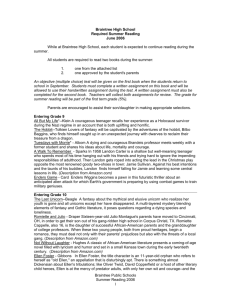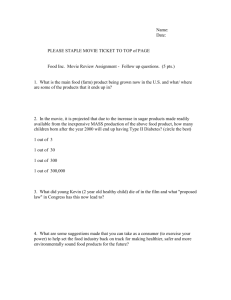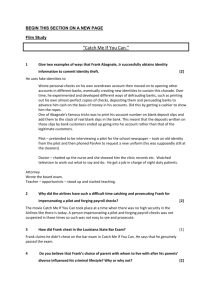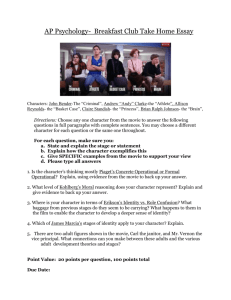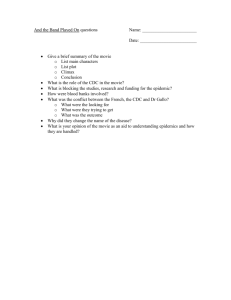INTERVIEW: FRANK ABAGNALE, JR
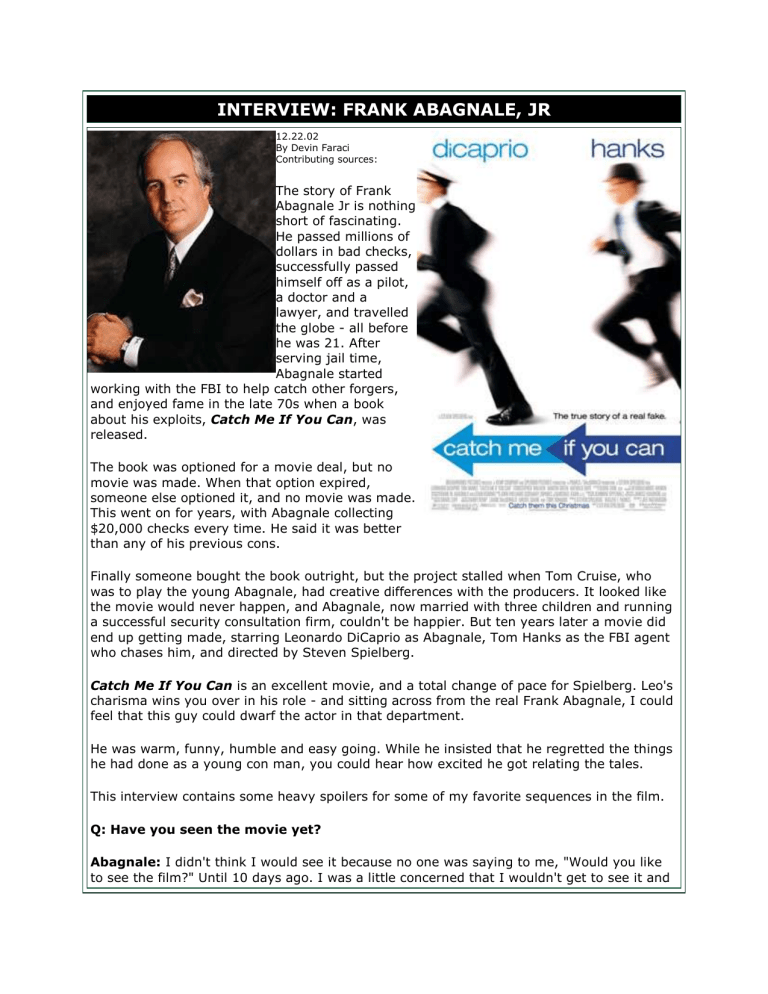
INTERVIEW: FRANK ABAGNALE, JR
12.22.02
By Devin Faraci
Contributing sources:
The story of Frank
Abagnale Jr is nothing short of fascinating.
He passed millions of dollars in bad checks, successfully passed himself off as a pilot, a doctor and a lawyer, and travelled the globe - all before he was 21. After serving jail time,
Abagnale started working with the FBI to help catch other forgers, and enjoyed fame in the late 70s when a book about his exploits, Catch Me If You Can, was released.
The book was optioned for a movie deal, but no movie was made. When that option expired, someone else optioned it, and no movie was made.
This went on for years, with Abagnale collecting
$20,000 checks every time. He said it was better than any of his previous cons.
Finally someone bought the book outright, but the project stalled when Tom Cruise, who was to play the young Abagnale, had creative differences with the producers. It looked like the movie would never happen, and Abagnale, now married with three children and running a successful security consultation firm, couldn't be happier. But ten years later a movie did end up getting made, starring Leonardo DiCaprio as Abagnale, Tom Hanks as the FBI agent who chases him, and directed by Steven Spielberg.
Catch Me If You Can is an excellent movie, and a total change of pace for Spielberg. Leo's charisma wins you over in his role - and sitting across from the real Frank Abagnale, I could feel that this guy could dwarf the actor in that department.
He was warm, funny, humble and easy going. While he insisted that he regretted the things he had done as a young con man, you could hear how excited he got relating the tales.
This interview contains some heavy spoilers for some of my favorite sequences in the film.
Q: Have you seen the movie yet?
Abagnale: I didn't think I would see it because no one was saying to me, "Would you like to see the film?" Until 10 days ago. I was a little concerned that I wouldn't get to see it and
then I would be sitting there with my children seeing it for the first time and not really knowing what the film was about, never having seen a script.
Q: Have you been upfront talking to your kids about your background?
Abagnale: When my oldest son was about 9, I basically gave him my book and told him I would like him to read it and told him, "Don't talk to me until you're done reading it." When he was done I went into his room and said, "Did you understand what you read?" "Yes." "Did you understand that the character in the book was me?" "Yes." "Do you understand that it's non-fiction?" "Yeah." So I told I had been to prison and this is what I do today. I did that with each child. But I think my children just see me as their father. They don't relate to me as this person who did this so many years ago, they only know me as their dad. When people say to me, "You have three wonderful children, they never caused you any trouble," I said, "No they didn't, they couldn't con me."
Q: There seems to be a lot of fictional characters in the movie, characters and scenes that are invented. How do you feel about that?
Abagnale: I've dealt with that all my life. When Stan Redding wrote the book, I thought he embellished it, overdramatized the French prison. Obviously I could never get away with being a doctor in a hospital for a year; it was a very short time, he made it out to a year.
But that is why I had to insist on a disclaimer on the book, because I did not feel the book was very accurate. Then Hollywood comes along and says forget that book, we're going to do it this way, tell the story this way. What I did feel about the movie, besides some minor things - obviously I had 2 brothers and a sister, they took that out of the film - my father was as honest as the day was long, but they made him a little bit more of a con man. But as far as how he dressed, how streetwise he was, how loving he was, that was my dad. I felt all of that was very accurate. As I said to my mother, "It's not a very flattering story about you, but in reality you and I know that's what happened."
Q: She's still alive?
Abagnale: She's 75 and lives in Mamaroneck. The whole thing of me running away, getting the check book, going downtown, seeing the crew come out of the Commodore Hotel, getting the idea to be a pilot, making the checks, doing all of that, is actually what happened. So I think that what Steven Spielberg did, and the reason I like it more than the book, he realized the book was overblown and so he toned the book way down. He made it more realistic to how it really was. What was a French prison really like? He went to a
French prison. Through the entire filming of movie there was an FBI agent who worked the case on the set every day. He's retired now but he was about 23, 24 when he worked the case. Bill Rader. And Bill Rader was on the set every day. And there was a real FBI agent who was on the set to make sure they were accurate in what they said about the FBI.
Q: The Tom Hanks character is fictional.
Abagnale: Well, he's a real person, Joseph Shea, who was the agent who arrested me and chased me. He's 83 years old, retired, has all his wits about him, in great health. He'll be at the premiere as a guest of Steven Spielberg. He and I have been friends for 25 years. He
watched my boys grow up, I watched his grandkids grow up, I speak to him on the phone probably about once a week. I write to him, I visit him when I'm in Atlanta. We've become close friends over 25 years that I've been doing what I do today. In the movie though I think that Steven Spielberg realized there were lots of people Shea worked with. "In reality," Shea told him, "There were many agents who worked the case, I just headed up the team." Rather than redo all those agents he made it into a composite character of Tom
Hanks. However - I never at any time called the FBI. The last thing I would be doing would be, "Hey, how are you guys?" I was trying to stay as far away from them as possible.
Q: So no Christmas phone calls?
Abagnale: None of that.
Q: Do you think a kid today could do what you did?
Abagnale: It's so much easier today because of technology. If we were going to sit down and create a check now it would take ten minutes with a laptop and a printer. We could make the most beautiful check in the world, prettier than any company's check that exists.
We could make up IDs and airline identification cards and all sorts of things with the color copiers, scanners, digitizers, ink jet printers, all the technology that's available today. So it would be a little more difficult to dress up as a pilot and get on a plane, but the act of committing frauds, stealing money, embezzling through electronic means and stuff like that, all those crimes, through technology, have become a lot easier, and will get a lot easier as the years go by.
Q: But is it possible to still do it on the scale you did it?
Abagnale: There are things that I get involved with, for example, check forgery. Twenty years ago, I would investigate check forgery cases or analyze cases for the bureau that involved a guy forging a $30,000 check. Today they're $1.7 million, $800,000 checks. The dollar amounts are beyond comprehension.
Q: Do you think that even with police databases and the like it would be possible for someone to do what you did, crisscrossing the globe?
Abagnale: Yeah. Unfortunately there are much more brilliant criminals than I was who have not been caught yet. Then we move to the world of the World coms and the Enrons, where we have brilliant educated people who are defrauding thousands of companies. What it really all comes down to, and I know people think it's simplistic, but the truth is what it comes down to is in America today we live in an extremely unethical society. We don't teach ethics at home, we don't teach it in school, you can't find a college that teaches ethics. So what we've come down to is we're a country with great technology and really unethical people. I tell my clients all the time: Amateurs hack into computers. Professionals hack people. You always go to the weakest link. If I need a customer's profile at Chase
Manhattan Bank, I'm not going to break into their database, I'm going to find an employee walking out at lunch and pay them $15,000 cash to go get what I need. And unfortunately
99.99% of the time they're going to go do it. We're living in a very unethical society and until we're willing to address that issue, crime is only going to get easier. Ironically, at the
[FBI] Academy I teach ethics. And I teach it because of who I am. I teach young agents about character and ethics. I try to stress to them the importance of that over everything else.
Q: You did have a kind of code of ethics. You only fleeced corporations or banks, never individuals.
Abagnale: I think what that was, is that I was raised at Iona, in New Rochelle, I went from kindergarten to high school. I was raised by Christian Brothers of
Ireland, I was raised in a Catholic family, I was raised to know right from wrong. So even though as we go down the road we stray from the right path I couldn't stray too far, because that was instilled in me. What would happen is that if I wanted to buy a pair of pants, I would think, "Well if I go in this store and write them out a check they'll be out a pair of pants and out the money. But I'll go here across the street to pass the check at the bank, they have a billion dollars and won't miss a hundred dollars, I'll go back and buy the pants. That was an adolescent's justification of what I'm doing. Literally, I could have honestly, truthfully walked into a store at that time and there could have been a register drawer open with 300 laying in it and the people in the back room, I wouldn't have taken a dime. I would have thought to myself,
"That's stealing. That's beneath me."
Q: How did you pass the Louisiana Bar Exam?
Abagnale: It wasn't very difficult. One, Louisiana did not require a law degree to take the bar back in those days. Second, Louisiana practices under the Napoleonic Criminal Code of
Procedure, based on parishes and not counties and so on. So had I been a Harvard graduate in Louisiana I would have had to study the Code to take the Bar. And Louisiana at that time allowed you to that the Bar over and over as many times as you needed. It was really a matter of eliminating what you got wrong, and having the IQ I had and the memory
I had, I could eliminate those things and go back and pass.
I never had any desire to be any of those people, I just fell into those things. I would always be willing to take it to the next level, to see if I could do it, and when I got to that level, it was enough for me. When I got to the hospital I did not need to stay at the hospital for a year. All I needed was to say, "Can I get in and be a doctor?" And when I saw the child with the leg and realized that this could be a child in a life or death situation. I knew right away that was not where I was supposed to be.
Q: How concerned were you about getting caught?
Abagnale: I was really never concerned. Because I was so young there was no thing about what if. I don't think the words "what if" ever came in. If I was going in somewhere I didn't premeditate it, and I didn't say "What if they do this, what if there's a guard at the door?"
What I said to myself was, "If that happens, I'll deal with it when that happens." I would go on. I would never sit there and think about the consequences, being an adolescent. I would never think, "What if they catch me? What will they do to me, where will I go?" That never entered my mind.
One thing that happens is that when you do criminal things, once you start doing them it's a lot easier to do the next one. It's like the guy who says, "Well I already murdered two people, the third is not a big deal." Unfortunately it's like that because you say, "Well, they're already looking for me, they're already chasing me."
Q: If your parents had not gotten divorced do you think your life would have undergone a very different turn?
Abagnale: I don't blame my parent's divorce for my actions, I blame only myself, but I think I probably wouldn't have ran away from home. I probably would have gone on to college, experienced what it was to go to college, I probably would have been an entrepreneur. I don't think I ever would have worked with somebody, I think I would have found a business to get into like my dad did and ended a businessman like I did anyway.
Q: What is the relationship with your brothers and sister?
Abagnale: My oldest brother is in Chester, New York. There's a school up there called Pope
Pious XII run by Catholic Charities for wayward children, my brother is the director of that school. And I have a brother who's a janitor in Mamaroneck New York, he lives right by my mother and works in a church for years in janitorial service. My sister is a nurse in a
Philadelphia hospital and she's been at the same hospital for thirty years. My relationship with them is very good. We laugh that ironically they all went to school and I turned out being the successful one.
Q: What was their reaction to your exploits?
Abagnale: I think they were amazed that I was doing all the things while I was doing them.
That whole sequence where they think I'm an adult is true. It took the FBI about three years to realize I was not an adult. When they really realized, not through Flash comics but through the sense that fingerprints were everywhere, so Shea started to ask, "We're searching for somebody supposedly 30, obviously American and no fingerprints on file." And this was back during the Draft, when everybody was fingerprinted when they registered. He thought maybe this is not a thirty year old, maybe this is a kid. And in the movie what they did very well, as there were no computers, was you went back through process of elimination so they went out and interviewed hundreds of people who had runaways until they came across me. Then take that picture to somebody who said, "Yeah, that's the guy."
That in the movie is exactly correct. I think my family learned about this only through the
FBI. They doubted it, "That's not him, he's just hitchhiking around Europe somewhere, he wouldn't do that." I think they realized I had done it and they accepted that I did and I went to prison and I served my time.
They, like me, thought this movie would never be made. Even then, when I sold the rights I thought "Who would make this movie?" And I never thought I would get this two fifty, I thought they would never make it, I would just get all these option bills. So when the guy bought it I really took that frame of mind, "I'm done, they paid me, I'm through. I hope they don't make it, so I don't have to go through all that and I got the money." But ten years later they did.
Q: Did you really carry around bags full of money?
Abagnale: I didn't carry money around like that. I had many safe deposit boxes.
Q: As you went on your check forging got much more technical. Where did you learn that?
Abagnale: Everything I did I researched. I think one of the most brilliant things I did was the routing of the check. I said to myself, "If I pass this bad check at this bank, tomorrow they know it's no good, so I can't go back to that bank." So if I got to know the teller, I could go back three or four times, cash a bunch of checks. "So how do checks work? When you cash it, what happens?" So I went to the public library and I learned that checks get cashed, they go to a clearinghouse, the Federal Reserve bank, they're processed and then they go back. I realized that the numbers [on the bottom of the check] were like zip codes, so if you altered that number, the check would go somewhere else. The farther you sent it, the longer it would take to get back. That's how I was able to go back to the same bank over and over, and go, "Remember me, I was here a week ago? You were kind enough to cash that Pan Am check?" They are assuming it cleared, it's no problem, they cash the new one for me and off I go.
The same thing with printing. I started off literally making them on an IBM Wheel Select typewriter, changing the fonts. As I went on I learned about printing and I learned about how to operate printing presses, starting with the small presses and then learning how to operate the big ones, do color separations, negatives, to make plates. Most of my business today is developing technology that goes into printing, so I've learned a tremendous amount about printing plastic, printing cards.
Q: What happened to all the money??
Abagnale: The money was kept in safety deposit boxes. What happened is when the government finally brought me back to the United States and arraigned me, the prosecutor said, "We want all the money back, we want to know where all the money is, and if you don't tell us where the money is, we're going to convict you and bring you back to court on income tax invasion, convict you of that and add twenty years to your sentence. It was all over the country, so I just gave them where the boxes are. They all swear that I still have a box hidden.
Q: What do you do now that, after the story laying low for so long, it's back out?
Abagnale: I go back to my business and do what I want to do. I believe that fame is very fleeting. This is an issue I'll have to deal with for several months, but it will go by just like it went by when I was famous in the late 70s, doing all the television shows. It went by and people forgot that I existed. I hope the same thing happens now, this will go on and people will forget. This will be the last chapter in my life, I won't have to deal with the notoriety again.
Q: When you were on the run did you ever think to yourself, "I'm going to stop when I have made so much money, or been so many places?"
Abagnale: Not so much money, but I stopped when I got to France because I was just tired of running. I was getting older and maturer and realizing that I couldn't live the rest of my life like that, and in reality they were going to catch me anyway. I just stopped and let them catch up with me.
Q: You never made a dime off the FBI in all the time you've been there?
Abagnale: Never. The FBI will tell you that they never paid me ten cents.
Q: So your money all comes from your business, and acting as a security consultant.
Abagnale: Right, and that's how I can afford to do this today.
